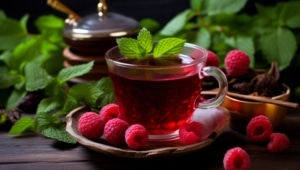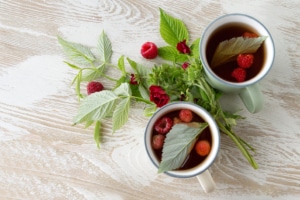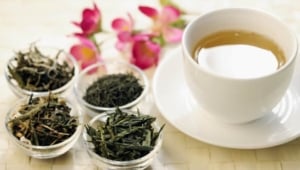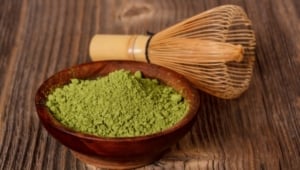5 Health Benefits of Raspberry Leaf Tea & 3 Risks

There are many different ways raspberry leaf tea can support your overall health. In this article, we’ll delve into some of the best ways you can benefit from drinking raspberry leaf tea. We’ll also cover how to make the best drinks with this refreshingly fruity, floral-tasting, naturally sweet tea.
For thousands of years, raspberry leaf tea has been used by women to help them prepare for childbirth. It’s a tea loved by Europeans and Native Americans, which has since become a well-known health drink across the entire world.
Enjoying raspberry leaf tea isn’t just helpful for pregnant women preparing themselves for birth. This magical tea offers a myriad of other health benefits.
What Raspberry Leaf Tea Is: Interesting Facts

What Raspberry Leaf Tea Is: Interesting Facts
Raspberry leaf tea is made from, unsurprisingly, the leaves of the red raspberry garden plant. Raspberry plants prefer well-drained, fertile, slightly damp (but not waterlogged) soil that is a little bit acidic.
They grow well in full sun in gardens between zone 3 and zone 10, so nearly everywhere in the US.
You don’t have to grow your own raspberry plants to enjoy raspberry leaf tea though. Raspberry leaf tea is readily available in supermarkets and online.
You’ll want to aim for an organic variety so as to avoid any residual pesticides and fungicides.
Origin and Where Raspberry Leaf Tea Comes From

Origin and Where Raspberry Leaf Tea Comes From
Historically, raspberry leaf tea was probably introduced by Native American women, including those of the Iroquois, Cherokee, and Mohawk Nations.
It’s been popular across the wider USA for at least the past 200 years, and is still popular among women in late pregnancy today.
What Raspberry Leaf Tea Is Made Of
Raspberry leaf tea is made from the leaves of the red raspberry plant. These are generally harvested in Spring-time and dried before being made into loose-leaf or bagged tea.
Raspberry leaf tea is usually sold on its own without any added herbs or other tea leaves, though it’s always a good idea to double-check the label to make sure.
What Raspberry Leaf Tea Tastes Like

What Raspberry Leaf Tea Tastes Like
Raspberry leaf tea tastes tangy, fruity, and sometimes a little bit bitter. To some it tastes somewhat like green tea, while others find it more herbaceous in flavor. It has both a refreshing tartness and a subtle sweetness.
What Red Raspberry Leaf Tea Is

What Red Raspberry Leaf Tea Is
Raspberry leaf tea is made using the leaves of red raspberry plants. It’s a delicious herbal tea that’s often used as a late pregnancy supplement.
Red raspberry leaf tea is also said to help with a variety of other health conditions, which we’ll cover below.
There isn’t any difference between red raspberry leaf and ‘regular’ raspberry leaf.
The only thing you may wish to pay attention to here is that, sometimes, teas labeled as just ‘raspberry’ could be blends of raspberry leaves, flavors, and other ingredients.
If you wish to reap the benefits of raspberry leaf tea, you’ll want to purchase just plain raspberry leaf tea.
Nutritional Facts and Calories of Raspberry Leaf Tea

Nutritional Facts and Calories of Raspberry Leaf Tea
Raspberry leaf tea on its own does not contain any calories unless sweetened or mixed with fruit juices.
Raspberry leaves are a good source of vitamins C, E, and B vitamins, and magnesium, calcium, zinc, flavonoids, tannins, and more. Raspberry leaf tea is caffeine free.
Health Benefits of Drinking Raspberry Leaf Tea

Health Benefits of Drinking Raspberry Leaf Tea
Raspberry leaf tea offers a variety of health benefits, particularly for women. Here we list some of the most valuable ways raspberry leaf tea can contribute to your wellbeing.
Bear in mind that dosage is always key. You’ll want to start with little amounts before building up towards any desired effects. When in doubt, speak to a doctor, and never take more than advised.
May Help Alleviate Labor Pains and Speed Up Childbirth

May Help Alleviate Labor Pains and Speed Up Childbirth
Raspberry leaf tea is said to help strengthen the muscles in your uterus and increase blood circulation.
The anti-inflammatory and antioxidant properties of this tea are also said to benefit your overall health when preparing for childbirth.
Some say that raspberry tea could speed up your child-birthing process, and that it may even help reduce bleeding during childbirth.
With that said, be careful with how much you consume, as too much could also lead to an upset stomach or cause intense contractions.
Could Help with Water Retention and Menstrual Cramps

Could Help with Water Retention and Menstrual Cramps
Raspberry leaf tea is said to work as a mild diuretic, which could reduce water retention during your period.
The tannin content of this tea is also said to help ease cramping during your period or when you suffer from other types of stomach pain. It’s also what’s said to tone and tighten your uterine muscles in preparation for labor.
Provides Helpful Antioxidants

Provides Helpful Antioxidants
Antioxidants in raspberry leaf tea may help reduce your risks of developing certain diseases, including some cancers and heart disease.
Antioxidants are helpful for ridding your body of free radicals and protecting your cells from damage. Many teas contain antioxidants, making them a helpful part of your everyday diet when consumed in moderation.
Helps Your Digestive System Function Properly

Helps Your Digestive System Function Properly
Raspberry leaf tea works similarly to a mild laxative, meaning it can help your digestive system to rid itself of waste in a more efficient manner.
With that said, overconsumption can also lead to unwanted side effects, namely diarrhea and pain.
If you’re new to raspberry leaf tea, simply keep your dosage on the lower levels to start with.
May Help Relieve Mouth Ulcers, Gum Disease, and Sore Throats

May Help Relieve Mouth Ulcers, Gum Disease, and Sore Throats
Raspberry leaf tea’s high tannin content is responsible for its helpful pain-soothing effects. It’s used for mouth ulcers, gum disease, and even sore throats.
Interestingly, blackberry and blueberry leaves appear to have similar astringent tannins, with similar effects for pain relief.
Potential Risks

Potential Risks
As with most herbal teas and supplements, the key to any risks is usually moderation. Having a small amount of raspberry leaf tea is unlikely to cause harm.
With that said, there are some risks to this tea, and you’ll want to speak to a doctor first if you’re considering having raspberry leaf anyway.
May Cause Early Labor or Miscarriage
Raspberry leaf tea may soften your cervix and induce early labor. Therefore, it should be avoided before you reach term at 37 weeks of pregnancy.
Might Slow Down Blood Clotting

Might Slow Down Blood Clotting
Raspberry leaf tea may work similar to some blood clotting medication and slow down blood clotting in your body. On the other hand, this may be beneficial during and after childbirth, as raspberry leaf tea can help prevent excessive bleeding.
May Increase Your Risk of Bleeding or Bruising
If you take blood clotting medication and have raspberry leaf tea alongside it, you may be increasing your risk of bruising or bleeding.
Is Raspberry Leaf Tea in Pregnancy Good For You?

Is Raspberry Leaf Tea in Pregnancy Good For You?
Raspberry leaf tea is a famous natural remedy used by mothers throughout the world. It’s said to strengthen your uterus and pelvic muscles, as well as working as a relaxant, and even shortening labor.
In other words, it can help make your labor shorter and the contractions and birth less painful.
As raspberry leaf tea is said to be quite a powerful natural remedy, you’re advised to only start taking it from 37 weeks of pregnancy onwards.
Before it could increase your chances of premature labor or miscarriage. After 37 weeks it may help soften the cervix and even induce labor, so consider it as a helpful addition to your pregnancy diet if you’re past your due date.
Besides helping you prepare for labor, raspberry leaf tea also offers a variety of minerals and vitamins such as vitamin A, C, E, iron, potassium, and calcium. It’s said to improve blood circulation, reduce inflammation, and relax your muscles.
Consider taking a flask of raspberry leaf tea to hospital once you’re in labor, or prepare some raspberry leaf tea ice cubes ahead of time to take and suck on.
Simple Guide for Making the Perfect Raspberry Leaf Tea

Simple Guide for Making the Perfect Raspberry Leaf Tea
Raspberry leaf tea is amongst the simplest teas to make at home. You can even make it from homegrown raspberry leaves.
With that said, dried organic raspberry leaf tea may be more convenient and you’ll have slightly more assurances of dosage. Here is a very simple recipe for making raspberry leaf tea at home using just that:
Ingredients:
- 1 tsp of dried red raspberry leaf tea
- 2-3 fresh or frozen raspberries (optional)
And here’s how you do it:
- Add boiled water to a cup and steep 1 tsp (or a tea bag) of red raspberry leaf tea for around 5 minutes.
- Add 2-3 fresh or frozen raspberries, stir, and enjoy.
For additional sweetness and flavors, take a look at our tips and hacks below.
Tips for Drinking and Serving Raspberry Leaf Tea

Tips for Drinking and Serving Raspberry Leaf Tea
Raspberry leaf tea is delicious on its own and offers plenty of natural sweetness. Yet always having it plain may get a little boring.
Why not try some of our tasty tips for drinking and serving raspberry leaf tea? Below are three of our favorites.
Add Honey for Some Sweetness and Additional Benefits

Add Honey for Some Sweetness and Additional Benefits
Honey is both a yummy additive to all kinds of teas as well as a health food in itself. Honey contains antioxidants, antibacterial, anti-inflammatory properties and more.
It’s said to protect your respiratory system, your intestines, your heart, and even your mind. It’s also perfectly safe to add honey to your tea in pregnancy.
While babies under 1 shouldn’t have honey due to the risk of developing botulism, our adult stomachs can handle honey just fine, and will even benefit from it.
Enjoy a Raspberry Leaf Iced Tea with Orange Juice

Enjoy a Raspberry Leaf Iced Tea with Orange Juice
Make a raspberry leaf iced tea at home by preparing your tea as usual, then chilling it until cold. Add some fresh orange juice (strained if you prefer it smooth) for extra antioxidants, calcium, potassium, vitamin C, and fiber.
Orange juice is also a great drink for pregnant women, with many even craving its taste. Making an iced tea with raspberry leaf and orange juice is therefore an excellent, refreshing option for just about anyone.
Mix Your Tea with Frozen Raspberries and Lemon

Mix Your Tea with Frozen Raspberries and Lemon
Did you know that frozen raspberries lock in all the flavor and nutrition of fresh raspberries when they are frozen? The consistency isn’t as plump and firm as that of fresh raspberries, but they’ll add plenty of goodness to your tea.
Raspberries are known for their fiber content as well as including vitamin C, B vitamins, manganese, potassium, phytonutrients, and omega-3.
Add some frozen raspberries and a slice of lemon to your hot or cold raspberry leaf tea for a refreshing, fruity treat with a touch of tanginess.
Additional Hacks and Tips for Raspberry Leaf Tea-Based Recipes

Additional Hacks and Tips for Raspberry Leaf Tea-Based Recipes
Have you fallen in love with raspberry leaf tea yet? If so, you might want to expand your culinary journey and try out some different recipes.
Here is a list of some of the best raspberry leaf tea-based recipes, including top hacks for adding more raspberry leaf into your diet.
Raspberry Leaf Tea Smoothie for Pregnancy

Raspberry Leaf Tea Smoothie for Pregnancy
What could be better than just plain raspberry leaf tea? A smoothie made with raspberry leaf tea, frozen raspberries, mango, and spinach.
You may also add some soy milk to your smoothie, which can improve your mood and help with blood sugar control.
Spinach and any other leafy green vegetables are great at adding iron to your diet if you’re suffering from pregnancy-related anemia.
To make this smoothie, mix all of the ingredients together and blend until smooth. Remember to enjoy your raspberry leaf tea-based drinks after week 37, to avoid premature labor.
Pink Raspberry Leaf Tea Lemonade

Pink Raspberry Leaf Tea Lemonade
Make some raspberry leaf tea and set it aside to cool to room temperature. Next, mix some fresh raspberries, lemon juice, and caster sugar until combined and no longer grainy.
Add some ice and pour over sparkling water and the cooled raspberry leaf tea. Enjoy with a slice of lemon.
Top tip: if you’re making this in pregnancy, you’ll love that lemon can help alleviate nausea, and also contain plenty of helpful minerals, vitamins, and nutrients.
Raspberry Leaf Tea Popsicles to Cool You Down

Raspberry Leaf Tea Popsicles to Cool You Down
If you are or have ever been pregnant in the height of summer, you’ll understand the appreciation one can feel for popsicles.
To make these, mix cooled raspberry leaf tea with some honey, raspberries, and pureed mango. Freeze in popsicle molds (readily available online and at cooking shops), and enjoy.
You can experiment further with these by adding other healthy ingredients, or by making our smoothie suggestions above and freezing.
- Chai Tea.Health Benefits and Hacks.
- Oreo Cookie Flavors. Best and Weirdest Flavors.
- Starbucks Refresher. Tips and Best Drinks.
- Jelly Belly Flavors. Best and Grossest.
- Boba Flavors. Best Flavors and Types.
- Pop Tart Flavors. Tasty Alternatives and Best Flavors.
- Cinnamon Tea. Health Benefits and Tips.





